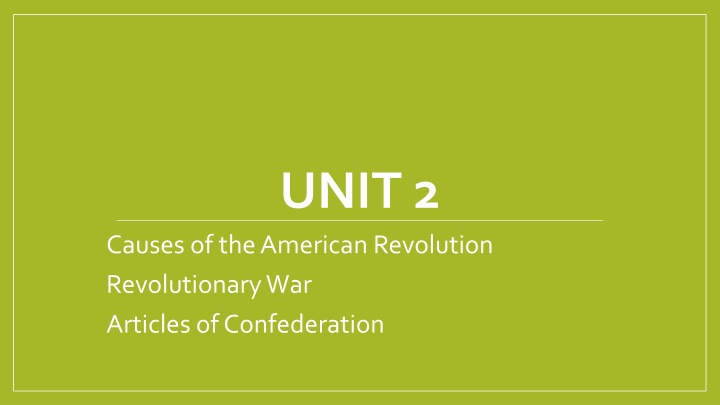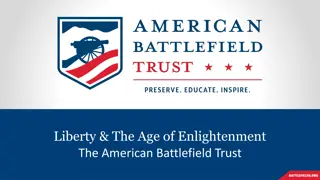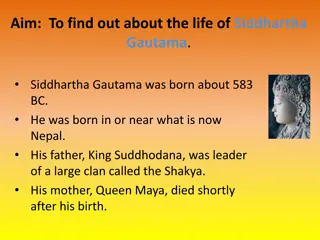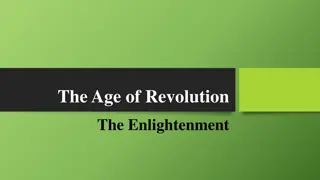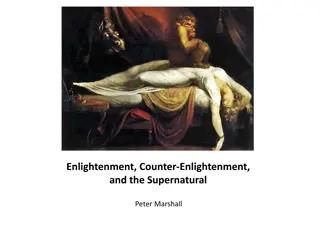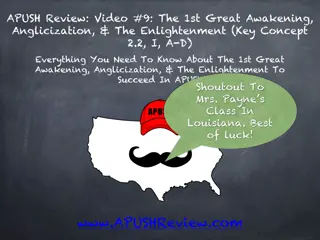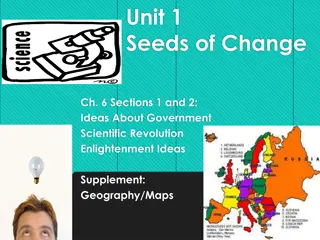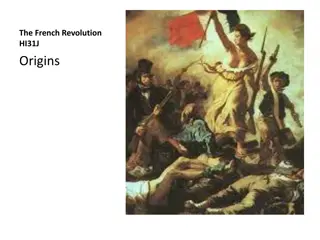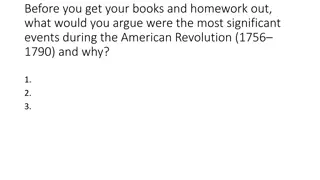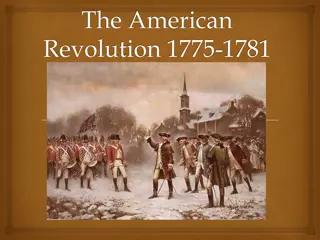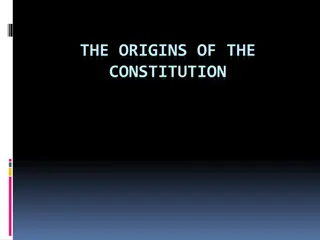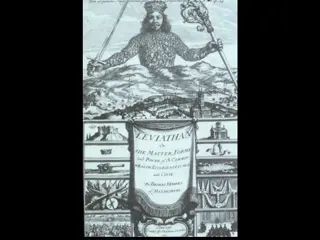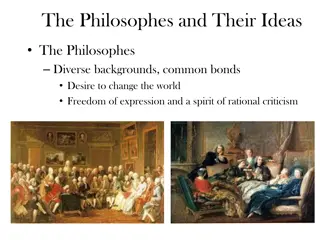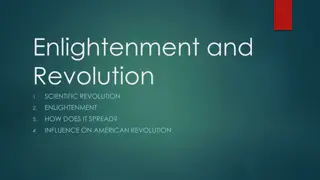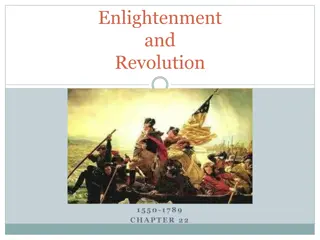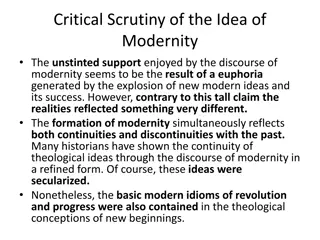Causes of the American Revolution and Enlightenment Influence
Explore the causes of the American Revolution, from key events and legislation to influential figures like George Washington and Thomas Jefferson. Discover the impact of Enlightenment thinkers like John Locke and Baron de Montesquieu on the revolutionary ideas that shaped American history.
Download Presentation

Please find below an Image/Link to download the presentation.
The content on the website is provided AS IS for your information and personal use only. It may not be sold, licensed, or shared on other websites without obtaining consent from the author.If you encounter any issues during the download, it is possible that the publisher has removed the file from their server.
You are allowed to download the files provided on this website for personal or commercial use, subject to the condition that they are used lawfully. All files are the property of their respective owners.
The content on the website is provided AS IS for your information and personal use only. It may not be sold, licensed, or shared on other websites without obtaining consent from the author.
E N D
Presentation Transcript
UNIT 2 Causes of the American Revolution Revolutionary War Articles of Confederation
Vocabulary:Dates 1776
Vocabulary: Documents/Legislation Articles of Confederation Proclamation of 1763 Common Sense Quartering Act Declaration of Independence Stamp Act Intolerable Acts Sugar Act Land Ordinance Tea Act Northwest Ordinance Townshend Act Olive Branch Petition Treaty of Paris 1783
Vocabulary: Events Battle of Saratoga Battle of Yorktown Battles of Lexington and Concord Boston Massacre Boston Tea Party Winter at Valley Forge
Vocabulary: People Abigail Adams Baron Friedrich Von Steuben Benjamin Franklin Bernardo de Galvez George Washington HaymSolomon John Adams John Locke John Paul Jones King George III Marquis de Lafayette Mercy Otis Warren Patrick Henry Samuel Adams Thomas Jefferson Thomas Paine Wentworth Cheswell
Vocabulary: Terms 1stContinental Congress Consent of the governed Natural rights Parliament 2ndContinental Congress Continental Army Patriots Grievances Sons of Liberty Civic Virtue Guerilla Warfare Taxation without Representation Civil Disobedience Loyalists Committee of Correspondence Mercantilism Unalienable Rights Monopoly
Influence of the Enlightenment Thinkers
Enlightenment Thinkers William Blackstone: wrote a book for on English law that were used to establish the foundations of our government. Blackstone. Black Robes. Baron de Montesquieu: Frenchman who proposed that government should be divided among 3 branches. Montesquieu. Separate. 3 Branches. John Locke: John Locke inspired the revolution in two ways 1. He said that all men are born with natural rights that no government can take away 2. He said that when a government becomes oppressive ( a tyranny), the people have a right to overthrow that government.
Causes of the American Revolution
Causes of the American Revolution At the end of the French and Indian War, King George III issued the Proclamation of 1763, which prohibited the colonists from moving west of the Appalachian mountains in order to prevent them from fighting with Native Americans. He sent 10,000 troops to enforce this. He also needed to find a way to pay for the war and debt that it caused. He decided to tax the colonists.
Causes of the American Revolution In order to pay off war debt, parliament (British Congress) passed a series of acts, or pieces of legislation that allowed them to tax the colonists. The colonists did not have a say in these taxes and began using the phrase Taxation without Representation as a slogan for the movement for independence. Great Britain was becoming a tyranny because Parliament did not have the consent of the governed (permission from the colonists)
Causes of the American Revolution Acts: Series of legislation that were either an economic burden or considered an invasion of privacy Sugar Act: Placed a tax on sugar Stamp Act: Placed a tax on printed materials Quartering Act: Required colonists provide food and shelter to Redcoats stationed in the colonies Townshend Acts Placed a tax on paper, paint, lead, glass, and tea
Causes of the American Revolution Angered by the presence of Redcoats in the colonies and the recent acts passed by Parliament, the colonists began reacting in several ways. Boycotts/Smuggling: Many colonists refused to buy British goods that were taxed in an attempt make their opinion known. They also began smuggling products like tea from other European countries. Aggression: In 1770, a crowd of Bostonians gathered and began throwing snowballs filled with rocks and mud at British troops stationed in Boston. The event escalated and British troops fired into the crowd. This event is know as the Boston Massacre.
Causes of the American Revolution Angered by the presence of Redcoats in the colonies and the recent acts passed by Parliament, the colonists began reacting in several ways. Civil Disobedience: Parliament repealed some of the taxes, but in their place passed the Tea Act, which gave the British a monopoly on tea. Many colonists began smuggling tea in from the Dutch. A grouped called the Sons of Liberty organized a protest. About 100 colonists dressed as Mohawk Indians marched to the Boston Harbor and dumped crates of tea into the harbor off British merchant ships. This is known as the Boston Tea Party.
Causes of the American Revolution British response: Following the Boston Tea Party Great Britain passed 5 laws known in the colonies as the Intolerable Acts to punish the colonists. Boston Port Act: The act closed the port of Boston to all ships until the colonists paid for the tea they dumped into the harbor. Administration of Justice Act: Witnesses would have to travel all the way to Britain to testify against an official, making it nearly impossible to convict. Massachusetts Government Act: It gave more power to the British governor and took away power from the colonists. Many of the government officials that used to be elected by the people would now be appointed by the governor.
Causes of the American Revolution After the passing of the Intolerable Acts, many colonists had reached the breaking point. 56 delegates met and discussed the complaints, or grievances, they had against Parliament and King George III. They created a petition that asked the King for redress of their grievances. They also agreed to meet again if King George III refused their requests Intolerable Acts Quiz- click me
Causes of the American Revolution In response to the Intolerable Acts, delegates from 13 colonies came together to form the First Continental Congress, where they voted to ban all trade with Great Britain until the acts were repealed. They sent a letter to King George III listing their grievances about the different acts passed following the French and Indian War. This letter was mostly ignored.
Events/Battles of the Revolution
The American Revolution Upon hearing that King George III was going to ignore the colonists requests to repeal the acts/taxes, Patrick Henry said Give me liberty or give me death. It was apparent that the colonists were starting to take sides on the idea of revolution. Loyalists: Colonists who would remain to loyal to England during the war. Patriots: Colonists who would fight for Independence during the war. They were patriotic.
The American Revolution In 1775 tensions had reached an all time and several colonies were forming militias, or small volunteer armies. These volunteers were called minutemen because they were ready to fight with only one minute s notice.
The American Revolution Battle of Lexington and Concord On April 19, 1775 word reached the colonists that the a group of Redcoats were planning to march on the cities of Lexington and Concord, Massachusetts. A group of minutemen were waiting for them at Lexington. They were ordered to drop their weapons. A shot was fired and it is still not known whether the British or the colonists fired first. When the smoke cleared, one Redcoat was injured. Nine colonists were injured and eight were killed.
The American Revolution Battle of Lexington and Concord The Redcoats marched on to Concord where they believed the colonists were stockpiling weapons. By the time the British reach Concord, the weapons had been relocated. They set fire to what little the found, but the fire grew out of control. Hundreds of minutemen saw this fire and believed that the British were trying to burn the town down. The militiamen hustled to Concord s North Bridge, which was being defended by a group of British soldiers. The British fired first but fell back when the colonists returned the fire.
The American Revolution Battle of Lexington and Concord This was the shot heard round the world later immortalized by poet Ralph Waldo Emerson. After searching Concord for about four hours, the British prepared to return to Boston, located 18 miles away. By that time, almost 2,000 had arrived, and more were constantly arriving. At first, the militiamen simply followed the British. Fighting started again soon after, however, with the militiamen firing at the British from behind trees, stone walls, houses and sheds. Before long, British troops were abandoning weapons, clothing and equipment in order to retreat faster. The American Revolution had started.
The American Revolution Following the events at Lexington and Concord, Ethan Allen and the Green Mountain boys seized Fort Ticonderoga. However, the colonists were still wanting to remain part of England and had not decided to push for independence. Delegates from the colonies met again at the Second Continental Congress where they drafted and sent the Olive Branch Petition. The Olive Branch Petition was a peace offering and said the colonies did not want to break away. King George III rejected the petition and the colonists realized a fight for independence was necessary.
The American Revolution The Declaration of Independence-July 4, 1776 Once word reached the colonies that King George III did not accept the peace offering, Thomas Jefferson began drafting the Declaration of Independence. The Declaration of Independence is a formal letter to the King George III and Parliament that ended the ties between the colonies and England.
The American Revolution The Declaration of Independence-July 4, 1776 When in the course of human events it becomes necessary for one people to dissolve the political bands which have connected them with another This quote explains that it has become necessary for the colonies to break away from England We hold these truths to be self-evident, that all men are created equal, that they are endowed by their Creator with certain unalienable Rights, that among these are Life, Liberty and the pursuit of Happiness This quote lists the unalienable rights which Thomas Jefferson adapted from John Locke s natural rights.
The American Revolution The Declaration of Independence-July 4, 1776 The history of the present King of Great Britain is a history of repeated injuries and usurpations, all having in direct object the establishment of an absolute Tyranny over these States. To prove this, let Facts be submitted to a candid world. Those quote served to introduce the grievances the colonists had against King George III. The grievances included his taking away of representative bodies/legislatures. They also argued KG3 refused to approve laws that were good for the colonists and the fact he taxed with them without their consent. Text of the Declaration of Independence
The American Revolution The Declaration of Independence- July 4, 1776 When the delegates at the Second Continental Congress signed the Declaration of Independence they were committing both Civic Virtue and Civil Disobedience. Civic Virtue:The signers new that it was the right thing to do because they were being treated unjustly. They doing something that was technically wrong but for the right reason. Civil Disobedience: Thesigners were technically committing treason, but it was for the right reason. Other examples of civil disobedience include Rosa Parks, Gandhi, and Martin Luther King jr.
The American Revolution Common Sense Thomas Paine created a pamphlet that he circulated throughout the colonies. He argued that the colonists should separate from Great Britain. He explained his argument in simple terms so more people would understand and support him and the delegates at the Second Continental Congress who had decided that independence was necessary.
The American Revolution Important Battles Battle of Lexington and Concord- Shot heard round the World /First battles of the Revolution Battle of Bunker Hill- Proved the colonists could/would fight Battle of Trenton- Washington defeated Hessian force and reenergized the Continental Army Battle of Saratoga- Turning point of the Revolution, convinced the Winter at Valley Forge- Proved the determination of the Continental Army and Baron Von Steuben training Washington s troops. Thomas Painewrote, The Crisis, to encourage colonists to keep fighting despite their self-sacrifice. Battle of Yorktown-The final battle of the Revolution. The British general Cornwallis surrendered his troops and ended the war.
The American Revolution Treaty of Paris 1783 Granted the colonists independence The colonies gained the land from the Appalachian Mountains to the Mississippi River flocabulary video and quiz
The American Revolution The Articles of Confederation The colonies needs a government to get them through the war so they created the Articles of Confederation. It created a congress and loosely tied that colonies together to form a government. It was the first government of the United States. However, the AoC were very weak and would not last much longer after the Revolution. Its main weaknesses were: Weak central government Congress could not pass taxes State started arguing over new boundaries Interstate tax problems Foreign countries did respect the new country Required all 13 states to approve changes to the Articles
The American Revolution The Articles of Confederation: Although the articles were weak, Congress did manage to pass two laws that were effective. Land Ordinance: established an orderly pattern for expanding into the Northwest Territory Northwest Ordinance: Provided a 3-step process for admitting new states into the union from the Northwest Territory.
